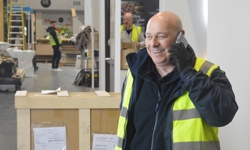“Both the nature and gravity of these threats call for an urgent impulse of solidarity amongst the media, to make us stronger in the struggle,” said Alvaro Caviedes, president of ANP, the National Press Association of Chile, co-host of the WAN-IFRA América Latina conference, which drew more than 200 participants from 25 countries to Santiago, Chile, last week.
Speakers described challenges ranging from high-levels of violence and impunity in countries like Mexico, Colombia and Central America, to generalised government offensives against independent media in Ecuador and Argentina.
Gustavo González, managing editor of PERFIL in Argentina, explained how the government had developed “surprisingly creative mechanisms to counter criticism” and pointed out that “it is key to be economically solid and have a strong will to avoid ceding the editorial line for official advertising.”
In Ecuador, where the government has threatened to imprison journalists and media executives and publicly insults media professionals, César Ricaurte, executive director of FUNDAMEDIOS, underlined the importance of solidarity networks amongst international organisations, press associations, and “a solid, vigorous local civil society, ready to defend its press.”
Brazilian journalist and professor, Eugênio Bucci, expressed his concern for what he called “the timid reactions from citizens to government attacks against the press.” He emphasised the importance of trying to counter such attacks by mobilising public opinion through “more plural and reader-oriented journalism.”
Mexican Journalist Anabel Hernández, WAN-IFRA’s 2012 Golden Pen of Freedom Award laureate, described how journalists were being caught in a wave of violence resulting from the armed conflict between government forces and competing drug cartels. She denounced the impunity enjoyed by perpetrators of crimes against journalists as a result of the inefficiency, and in some cases complicity, of certain government agencies. In light of this tough reality, she added that “the division among the media in Mexico is its weakest element, and both drug traffickers and the government know this and profit from it.”
“We’re doing survival journalism,” explained the RIODOCE director, Ismael Bojórquez. Based in Culiacán, Sinaloa, Mexico, the director of the award- winning weekly publication said: “Such levels of violence have no precedent in Mexico, except for the 1910 Revolution.” Certain newspapers have taken specific measures to counter this violence, as Javier Garza, deputy director of daily El Siglo de Torreón in the Mexican state of Coahuila explained: “We have developed an internal security protocol for our journalists that takes into account personal protection but also editorial content.”
Alvaro Sierra, editor-in-chief of SEMANA weekly in Colombia, said “solidarity amongst journalists, executives, and between executives and directors, is key for any newspaper to survive under such conditions.”
WAN-IFRA’s annual América Latina conference gathers journalists and media executives from the region to discuss the major press freedom challenges, editorial content innovations, business practices and technological advances.
About WAN-IFRA
WAN-IFRA says: “WAN-IFRA, based in Paris, France, and Darmstadt, Germany, with subsidiaries in Singapore, India, Spain, France and Sweden, is the global organisation of the world’s newspapers and news publishers. It represents more than 18,000 publications, 15,000 online sites and over 3,000 companies in more than 120? countries. Its core mission is to defend and promote press freedom, quality journalism and editorial integrity and the development of prosperous businesses.”










